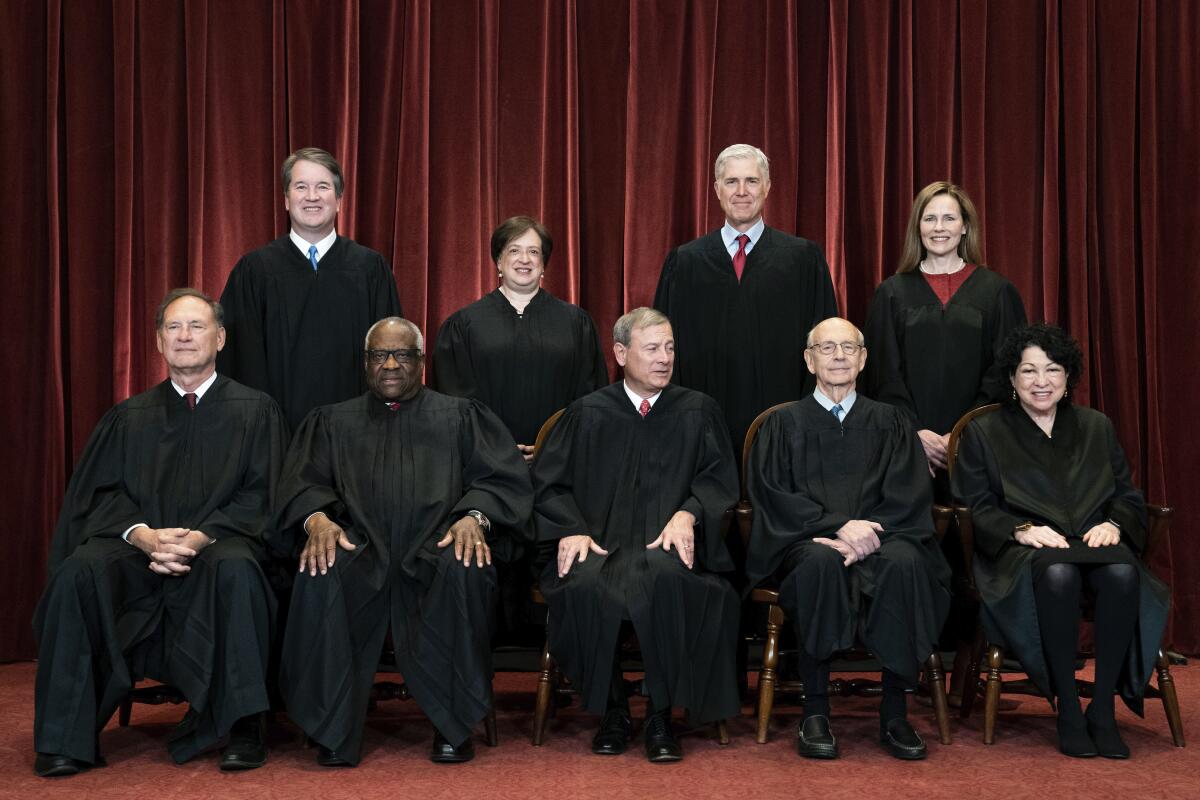Column: Donât attack the Supreme Court for Congressâ failure on the COVID eviction crisis

In a major victory for constitutional norms, the Supreme Court overturned a lawless and essentially authoritarian policy of the Trump administration and progressives are furious.
You read that right.
Letâs catch up. On March 27, 2020, Congress passed the CARES Act, and Donald Trump signed it into law. One provision of the massive $2.2-trillion legislation imposed a temporary ban on evictions for renters in response to the economic hardships caused by the pandemic. The case for the moratorium at the time didnât rest on public health, but on the fact that the country was heading into a lockdown. Asking people to pay rent when they were told they couldnât go to work didnât make a lot of sense.
When the ban expired, long after the lockdowns ended, Congress opted not to extend it. So, with much self-congratulation, the Trump administrationâs Centers for Disease Control and Prevention issued an eviction moratorium of its own, now under the dubious pretext of stopping the spread of COVID-19. That moratorium extended into the first months of the Biden administration.
In June, the Supreme Court ruled that the CDC didnât have the authority to nullify rental contracts across the country. But if Congress wanted to pass a law to continue the policy, as it had under the CARES Act, it could.
Congress declined. Instead, leading Democrats asked Biden in effect to defy the court and just do it again. At first, the White House said it couldnât because that would be unlawful. But then Biden did it anyway, admitting he was doing it just to buy some time and violating his oath in the process.
As expected, the court blocked the ban on Thursday.
âLast night, the Supreme Court immorally ripped away that relief in a ruling that is arbitrary and cruel,â Speaker Nancy Pelosi (D-Calif.) said in a statement the following day. Rep. Jamaal Bowman (D-N.Y.) denounced the decision by a âRepublican-packed Supreme Courtâ that will âput millions of people in danger.â Rep. Ayanna Pressley (D-Mass.) declared that âThe Supreme Court is on the wrong side of history in the midst of this crisis.â
White House press secretary Jen Psaki said in a statement that the administration is âdisappointedâ with the ruling, which it knew was coming.
Now, I think the conservative majority wasnât nearly as âextremeâ as it should have been. Justice Brett M. Kavanaugh, in his July ruling, had told the administration it couldnât do this unilaterally. The president responded in bad faith. The court should have read him the riot act.
Moreover, the very idea that a politically appointed bureaucrat has carte blanche to do whatever he or she wants simply by invoking a crisis is a profoundly dangerous principle. Youâd think Democrats, after four years of fretting over Trump as a would-be dictator and his various assaults on democratic and constitutional norms, would have some appreciation of this.
Personally, Iâm not convinced that even Congress has unbridled power to negate millions of legal contracts and abrogate property rights indefinitely. The unsigned ruling didnât address this idea, which is at least a debatable proposition. Indeed, the courtâs majority took no position on the policy at all. Rather it said: âIf a federally imposed eviction moratorium is to continue, Congress must specifically authorize it.â
And this is what is so infuriating about the attacks on the court. For decades, the legislative and executive branches â under Democrats and Republicans alike â have refused to do their jobs as outlined in the Constitution. They behave like children, whining about what policies they want, but are unwilling do the work to get them. And then, when the Supreme Court behaves like a grown-up, preventing this administration or that one from ruling like monarchs, the politicians complain about that, too. Worse, some see the court doing its job as an argument for packing it with pliant enablers of this dysfunction.
Indeed, the most dismaying thing about the courtâs decision isnât the utterly reasonable majority ruling, but the minorityâs dissent. Written by Justice Stephen G. Breyer, the courtâs liberals believe that unless Congress explicitly denies the CDCâs power to do something, the court should assume the executive branch can do whatever it wants. Imagine the reaction if the Trump administration made this kind of argument.
People wonder why our institutions are suffering from a crisis of legitimacy, when the answer is obvious: Our elected leaders would rather whine and cast blame than do the jobs they were elected to do.
More to Read
A cure for the common opinion
Get thought-provoking perspectives with our weekly newsletter.
You may occasionally receive promotional content from the Los Angeles Times.











